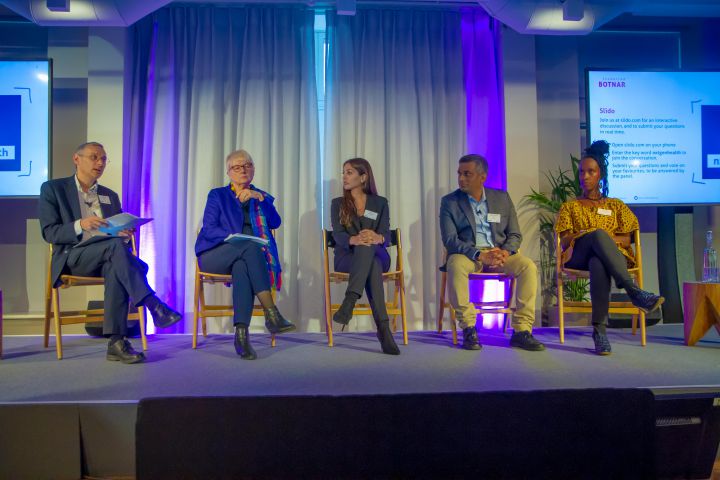Around the globe, disruption driven by advancements in artificial intelligence (AI) and big data is showing exciting potential in improving population health. Yet, how do we make sure the strides that we take forward are really impactful and beneficial for all? Where are the opportunities, and equally, where are the barriers? Last month, Fondation Botnar, together with the London School of Hygiene & Tropical Medicine (LSHTM) and the Wellcome Trust, hosted a dialogue event to tackle some of these prevailing questions to successfully advance the discussion of frontier technologies for meaningfully contributing to equitable health.
As AI/Digital Program Manager for Fondation Botnar, it was a privilege to participate alongside the other panelists, who brought a wealth of experience in the digital health space. The discussion captured a wide range of topics, from equity in data governance to the emergence of parallel digital health systems (watch the full recording and read the report summary here). However, there was one unanimous message from the panel: if we are to truly apply digital health to reduce inequities across population health, all voices must be included, and most importantly – heard.
Below are my four key takeaways.
1. Digital health can and will exponentially transform the healthcare ecosystem.
Innovations and applications take many forms and those discussed at the event were diverse, dynamic and progressive. References ranged from the uses of geospatial surveillance data, which is being used to effectively track diseases such as Ebola and HIV, to imaging analysis able to accurately measure a baby’s weight from a photograph. Prof. Peter Piot, of LSHTM mentioned how imaging analysis has tremendous potential to cut costs in healthcare by freeing up the time of the ‘middle men’, such as diagnostic nurses and doctors. This is not to say that digital health will replace these doctors, rather, that AI could allow its human counterpart to take on more of the emotional role within healthcare; to be more human. There was also Ada Health, one of the organisations Fondation Botnar is proud to partner with, which is using its AI-powered health platform to expand access to health advice. Most recently the foundation funded the addition of the Swahili translation to the app. Ada Health has undertaken 10 million public diagnoses and has over 1 million users in India alone.
2. Should algorithms be pre-qualified?
As Prof. Ilona Kickbusch stated in the event, “in the same way we pre-qualify medicines, we must pre-qualify algorithms”. As algorithmic applications are built into the digital health system, and consequently into health systems as a whole, we must ensure they are fit for purpose and ethically unbiased. It was suggested by the panel that health-minded algorithms should be peer-reviewed for their significance and effectiveness, in the same format as other science fields; the recent Babylon Health algorithm peer-review being a good example.
3. We should facilitate low- and middle-income countries to build their own, integrated
digital health systems.
There is a tendency in the health sector to focus on the importance of recreating established processes and structures. Unfortunately, with this comes a tendency to want to replicate health systems as they stand in high-income countries. These systems have been built over centuries, and are not as lean and agile as they could be. African countries are embracing pioneering technology, such as Zipline, the drone technology, deploying live-saving medical supplies to remote areas. In that respect, we should allow low- and middle-income countries to experiment with the new frontiers of AI, big data, and machine learning together with health. In due course, it is actually likely that high-income will have to catch up with these new, integrated digital health systems, which have the opportunity to be far faster, decentralised, and more accurate than the high-income health systems could currently hope to be.
4. New technology allows for anonymous discussions and could factor in the social
determinants of health better than current systems do.
Both Akaliza Keza Ntwari, from UN High-Level Panel on Digital Cooperation, and Hila Azadzoy, Managing Director of the Global Health Initiative at Ada Health, mentioned how digital doctors, anonymous platforms and more, can mitigate difficulties in communicating health problems and bypass sometimes limiting social norms. A third of 23- to 26-year-olds reported never having a private discussion with a doctor, a problem that could be solved with mobile apps. A menstrual tracker could also be programmed to better help a woman’s period health complications. What’s clear is that innovations in digital technology and AI aimed at low- and-middle-income countries are a key factor in disrupting the health market and bolstering the innovation ecosystem for the better. I am glad that the values of Fondation Botnar, creating a better tomorrow for all young people were brought into such an important dialogue.
These events are crucial in informing public opinion about digital health and AI, and in the future, we must take an active effort to bring these panel events to low- and middle-income countries – follow us to stay up to date on our news and events @FondationBotnar.
